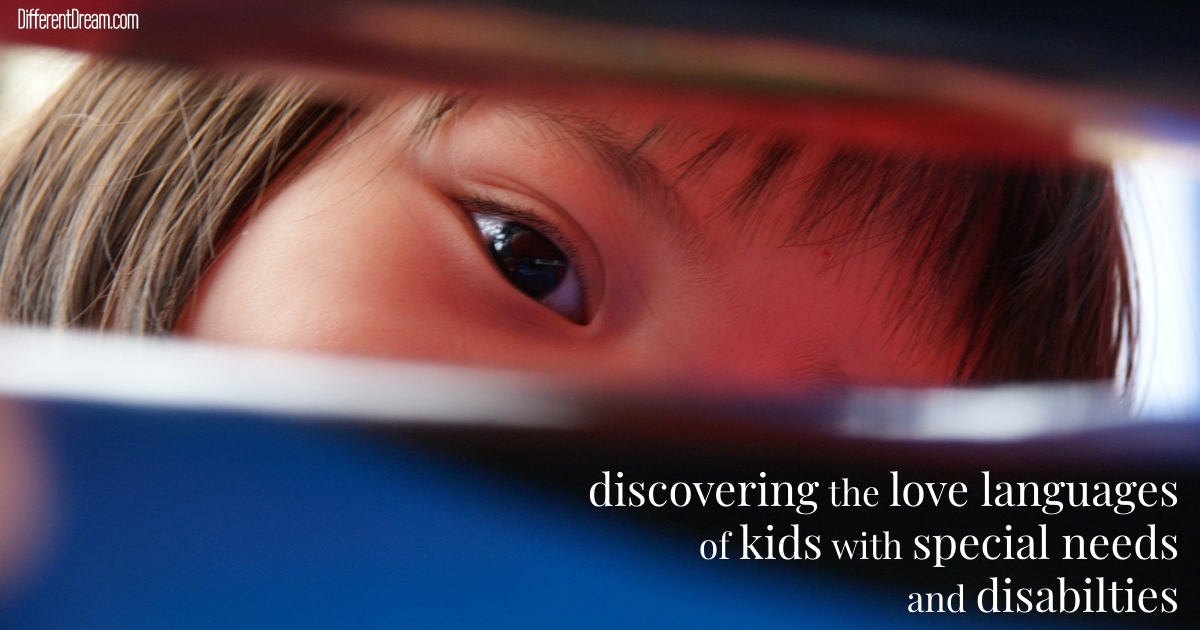Determining the Love Language of a Child with Special Needs or a Disability

Determining the love language of a child with special needs or a disability may be easy for some families and more challenging for others. So said the parents who share their stories in chapter 5 of Sharing Love Abundantly in Special Needs Families: The 5 Love Languages® for Parents Raising Children with Disabilities.
Whether children were non-verbal or verbal, developmentally delayed or physically disabled, behaviorally challenged or compliant, parents who successfully discovered the their kids’ primary language used the same two tools–trial and error followed by keen observation. You can use the same tools to discover your child’s language by implementing these 5 strategies.
Strategy #1
Use all the love languages with children ages 5 and younger. Take care to observe which one results in the most consistent positive responses from your child. That is most likely your child’s primary love language.
Strategy #2
If your child is developmentally between the ages of 5 and 8, choose 1 love language to use with him for a week or two. Write down how he responds in a notebook. Then move on to another love language for a couple weeks. Proceed through all 5 languages and then read through your notes. As was the case in strategy #1, the language that elicited the most consistent, positive responses is most likely your child’s primary love language.
Strategy #3
Children who are over age 8 may be able to complete a love language quiz. You can even help them take it. Versions for kids and teens can be found at the end of chapter 1 of Sharing Love Abundantly in Special Needs Families. Complete the quiz, tally your child’s score, and you’ll know your child’s primary love language.
Strategy #4
The first 3 strategies will work for most children. However, if a child struggles to communicate or is non-verbal, ask these 3 questions which were designed by the parents of a little girl with autism.
- What calms my child?
- What motivates my child?
- Where does my child choose to spend time?
The answers to those questions should help you pinpoint your child’s love language.
Strategy #5
Determining the love language of a child with special needs or a disability may be impossible for some reason. In that case, use all 5 love languages equally. You’ll be sure to hit your child’s language at least 20% of the time.
More about each of these strategies is found in Sharing Love Abundantly in Special Needs Families and in the other articles in the series, which are listed below. And return in April for an article packed with ideas for using the love languages with kids who have special needs and disabilities. You won’t want to miss it.
Other articles in this series:
The Love Languages and Special Needs Families: A Good Combination
Basic Love Language Concepts to Ease Stress and Increase Joy in Caregiving Families
Threats to Caregiving Marriages and How To Fight Them
Love Is a Child’s First Language
Ways to Speak Words of Affirmation and Quality Time to Kids with Special Needs
Ways To Speak Gifts and Acts of Service to Kids with Special Needs
Speaking Healthy Physical Touch to Kids with Special Needs
Using the Love Languages with Siblings of Kids with Special Needs and Disabilities
Extended Family Members Can Use the Love Languages to Encourage Caregiving Parents
Communicating Your Child’s Love Language to Medical Professionals
Communicating Your Child’s Love Language to Educators
Do you like what you see at DifferentDream.com? You can receive more great content by subscribing to the monthly Different Dream newsletter and signing up for the daily RSS feed delivered to your email.
By Jolene
Jolene Philo is the author of the Different Dream series for parents of kids with special needs. She speaks at parenting and special needs conferences around the country. She’s also the creator and host of the Different Dream website. Sharing Love Abundantly With Special Needs Families: The 5 Love Languages® for Parents Raising Children with Disabilities, which she co-authored with Dr. Gary Chapman, was released in August of 2019 and is available at local bookstores, their bookstore website, and at Amazon.
Related Posts
Therapy is Not a Child’s Love Language.
Guest blogger Heather Braucher explains how she learned that therapy is not a child’s love language, even if it is a necessity.
Resources for Caregiving Parents Recommended by Caregiving Parents
The Sharing Love Abundantly blog series wraps up with a look at the caregiver-recommended resource section at the end of the book.
Wisdom from Caregiving Parents about the Love Languages and More
The final chapter of Sharing Love Abundantly is full of wisdom from caregiving parents. Here are a few nuggets to whet your appetite.






0 Comments